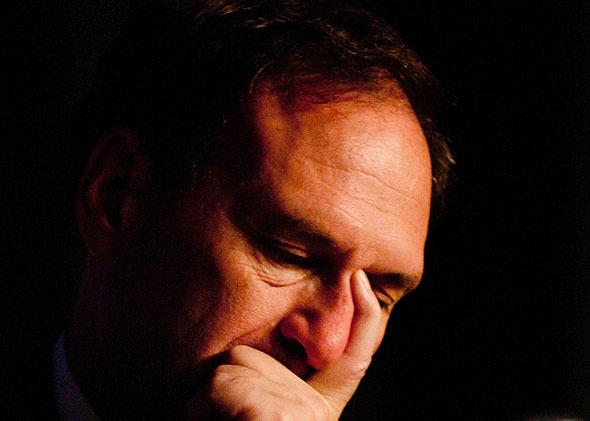Over a remarkably brief period of time, same-sex civil marriage has gone from being a cause advanced by a small handful of activists to one that’s been embraced by 60 percent of Americans, including a majority of Republicans under the age of 30. As we contemplate the monumental Supreme Court decision establishing a constitutional right to same-sex marriage, it’s worth stopping to consider why support for same-sex marriage has grown so rapidly.
One possibility is that there is a network externality effect at work, as the sociologist Gabriel Rossman suggested back in 2009. Rossman argued that same-sex marriage gained ground in part because influential policymakers were desperate not to be on the wrong side of history. While policymakers shift their stances on all kinds of issues, some of them take on greater weight than others. When we look back at defenders of segregation, for example, we look upon them differently than we do on those who argued that Eisenhower’s Interstate Highway System was going to be a colossal flop. Precisely because same-sex marriage is such a morally charged issue, the stakes for getting it wrong are high. The louder, more definitive the position you take against same-sex marriage, the more embarrassed you might be in the future. While I’m sure that many of the politicians who have had a sudden conversion on the subject of same-sex marriage in the last few years are entirely sincere in their change of heart, and would have shifted on the issue even if doing so came at great personal cost, I imagine that rather a lot of them are as calculating and self-interested as the rest of us: They saw where the young and influential were heading, and they didn’t want to get left behind.
Hunter Schwarz of the Fix reminds us that while Barack Obama and Hillary Clinton often tout their support for same-sex marriage, they embraced the issue only when it was overwhelmingly popular among Democrats. Barack Obama famously told Rick Warren of Saddleback Church that he opposed it on biblical grounds, though supporters of same-sex marriage didn’t seem to believe him. Among liberal politicians, it is entirely plausible there has long been a great deal of secret support for same-sex marriage, but as liberal candidates in the 2008 cycle, Obama and Clinton felt they had to defer to opposition to same-sex marriage among voters, at least for a time. As public opinion shifted, more liberal politicians felt that they could show their true colors. My sense is that something similar is at work among conservative politicians, albeit on a delayed timetable. Conservatives are far more likely to oppose same-sex marriage than liberals, yet opinion among conservative voters is shifting, and I’d be shocked if conservative politicians didn’t shift with it.
Public opinion matters for candidates for office, but it also matters for judges. Support for same-sex marriage is even more overwhelming among the highly educated, particularly in America’s larger cities, than it is among the general public, and to oppose same-sex marriage is increasingly to invite opprobrium in these circles. The justices of the Supreme Court are certainly familiar with this social milieu, and several of them are very much a part of it. As Michael Dorf, a professor at Cornell Law School, has put it, “[a] judge or Justice who is asked to preside over the same-sex wedding of a former law clerk cannot help finding the experience relevant to how he or she views the constitutionality of a law forbidding such a ceremony.” When we consider the justices through this lens, it should come as no surprise that the Supreme Court ruled 5–4 in favor of a constitutional right to same-sex marriage. But there is a bit more to it than that.
Back in 2005, Peter Berkowitz, a conservative political theorist, made the case that the triumph of same-sex civil marriage was all but inevitable. The reason he gave was that arguments that can be made in the language of individual freedom almost always win out in the constitutional realm over those grounded in other considerations. One could argue that the debate over abortion is a clash between two interpretations of what individual freedom demands. Do we protect the autonomy of women or do we protect the rights of unborn children? The fact that both sides of the abortion debate can be rooted in the language of individual freedom has kept the debate alive.
But the debate over same-sex marriage is different. Advocates of same-sex marriage insist that the organization of intimate relations should be left up to the individuals in question, an idea that has become an article of faith among modern Americans. Proponents alone are rooting their arguments in individual freedoms. Critics of same-sex marriage, in contrast, tend to emphasize the potential harms children might experience as society moves away from traditional marriage. The problem is that this is a line of argument that might also apply to permitting premarital cohabitation, promiscuity, no-fault divorce, and a permissive attitude toward adultery, among other behaviors that the state chooses not to regulate on grounds of personal freedom. “Because it is more difficult to translate arguments against same-sex marriage into the language of freedom,” Berkowitz observed, “there is a good chance that should the issue come before the Supreme Court, some majority of the justices will hold that the Constitution requires it.” He was right, though even he was probably surprised at how quickly his prediction came true.
Read more of Slate’s coverage of same-sex marriage at the Supreme Court.
